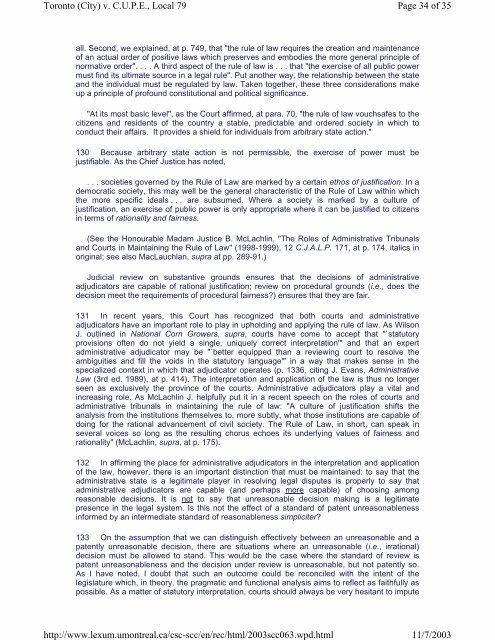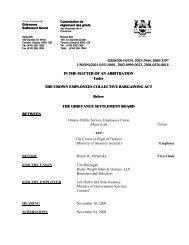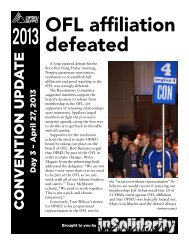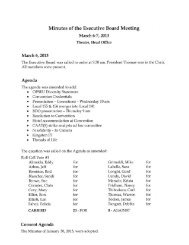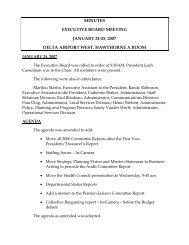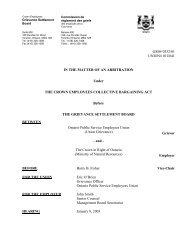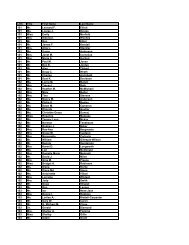C.U.P.E., Local 79 v. Toronto (City) .pdf - OPSEU
C.U.P.E., Local 79 v. Toronto (City) .pdf - OPSEU
C.U.P.E., Local 79 v. Toronto (City) .pdf - OPSEU
You also want an ePaper? Increase the reach of your titles
YUMPU automatically turns print PDFs into web optimized ePapers that Google loves.
<strong>Toronto</strong> (<strong>City</strong>) v. C.U.P.E., <strong>Local</strong> <strong>79</strong><br />
http://www.lexum.umontreal.ca/csc-scc/en/rec/html/2003scc063.wpd.html<br />
Page 34 of 35<br />
11/7/2003<br />
all. Second, we explained, at p. 749, that "the rule of law requires the creation and maintenance<br />
of an actual order of positive laws which preserves and embodies the more general principle of<br />
normative order". . . . A third aspect of the rule of law is . . . that "the exercise of all public power<br />
must find its ultimate source in a legal rule". Put another way, the relationship between the state<br />
and the individual must be regulated by law. Taken together, these three considerations make<br />
up a principle of profound constitutional and political significance.<br />
"At its most basic level", as the Court affirmed, at para. 70, "the rule of law vouchsafes to the<br />
citizens and residents of the country a stable, predictable and ordered society in which to<br />
conduct their affairs. It provides a shield for individuals from arbitrary state action."<br />
130 Because arbitrary state action is not permissible, the exercise of power must be<br />
justifiable. As the Chief Justice has noted,<br />
. . . societies governed by the Rule of Law are marked by a certain ethos of justification. In a<br />
democratic society, this may well be the general characteristic of the Rule of Law within which<br />
the more specific ideals . . . are subsumed. Where a society is marked by a culture of<br />
justification, an exercise of public power is only appropriate where it can be justified to citizens<br />
in terms of rationality and fairness.<br />
(See the Honourable Madam Justice B. McLachlin, "The Roles of Administrative Tribunals<br />
and Courts in Maintaining the Rule of Law" (1998-1999), 12 C.J.A.L.P. 171, at p. 174, italics in<br />
original; see also MacLauchlan, supra at pp. 289-91.)<br />
Judicial review on substantive grounds ensures that the decisions of administrative<br />
adjudicators are capable of rational justification; review on procedural grounds (i.e., does the<br />
decision meet the requirements of procedural fairness) ensures that they are fair.<br />
131 In recent years, this Court has recognized that both courts and administrative<br />
adjudicators have an important role to play in upholding and applying the rule of law. As Wilson<br />
J. outlined in National Corn Growers, supra, courts have come to accept that "`statutory<br />
provisions often do not yield a single, uniquely correct interpretation'" and that an expert<br />
administrative adjudicator may be "`better equipped than a reviewing court to resolve the<br />
ambiguities and fill the voids in the statutory language'" in a way that makes sense in the<br />
specialized context in which that adjudicator operates (p. 1336, citing J. Evans, Administrative<br />
Law (3rd ed. 1989), at p. 414). The interpretation and application of the law is thus no longer<br />
seen as exclusively the province of the courts. Administrative adjudicators play a vital and<br />
increasing role. As McLachlin J. helpfully put it in a recent speech on the roles of courts and<br />
administrative tribunals in maintaining the rule of law: "A culture of justification shifts the<br />
analysis from the institutions themselves to, more subtly, what those institutions are capable of<br />
doing for the rational advancement of civil society. The Rule of Law, in short, can speak in<br />
several voices so long as the resulting chorus echoes its underlying values of fairness and<br />
rationality" (McLachlin, supra, at p. 175).<br />
132 In affirming the place for administrative adjudicators in the interpretation and application<br />
of the law, however, there is an important distinction that must be maintained: to say that the<br />
administrative state is a legitimate player in resolving legal disputes is properly to say that<br />
administrative adjudicators are capable (and perhaps more capable) of choosing among<br />
reasonable decisions. It is not to say that unreasonable decision making is a legitimate<br />
presence in the legal system. Is this not the effect of a standard of patent unreasonableness<br />
informed by an intermediate standard of reasonableness simpliciter<br />
133 On the assumption that we can distinguish effectively between an unreasonable and a<br />
patently unreasonable decision, there are situations where an unreasonable (i.e., irrational)<br />
decision must be allowed to stand. This would be the case where the standard of review is<br />
patent unreasonableness and the decision under review is unreasonable, but not patently so.<br />
As I have noted, I doubt that such an outcome could be reconciled with the intent of the<br />
legislature which, in theory, the pragmatic and functional analysis aims to reflect as faithfully as<br />
possible. As a matter of statutory interpretation, courts should always be very hesitant to impute


